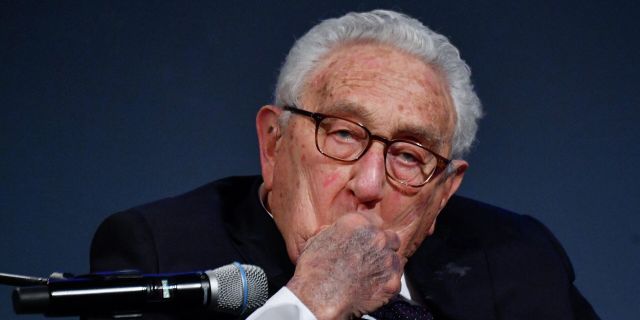After Ukraine, America must think in a new way
Half a century has passed, and America's foreign policy elite has not understood Henry Kissinger's advice about the need to put up with restrictions, the author of TNI notes. The United States still has the instincts of a global leader, and America's reaction to the Ukrainian crisis proves this best of all.
Tom Switzer
"Overcoming your own limitations is always difficult," Henry Kissinger once wrote about the American experience of the late 1960s. "It can end in despair or rebellion, or you can hate yourself, and from this inevitable compromises turn into a sense of inferiority." To avoid the hubris and excesses that led the country into the Vietnam quagmire, the former national security adviser and Secretary of State advised: "We need to come to terms with the fact that some options are no longer available."
Half a century has passed, and the American foreign policy elite has not understood the advice of Henry Kissinger. Today, Washington agrees that the United States, despite the fiasco after September 11 in Iraq and other countries, is still able to impose its will and influence on the whole world. However, in the 1990s and early 2000s, the lexicon changed: no one seriously proclaimed either a "new American century" or a "benevolent world hegemony". But the instincts of a global leader in the United States remained.
And America's reaction to the Ukrainian crisis proves this best of all. Vladimir Putin's erroneous February special operation is based on a banal truth: Russia will not stop its destructive campaign until Washington renounces Ukraine's membership in NATO. But this point of view contradicts the consensus prevailing in the West that the crisis is not connected with the expansion of NATO or the EU, nor with the so-called color revolutions, but is entirely dictated by Putin's expansionism in Eastern Europe.
This topic is certainly complex, and in order to understand Russia's strategic attitude to its near abroad, it is worth going back a quarter of a century ago, when heated debates about NATO expansion were simmering in Washington.
One of the leading critics at that time was Owen Harris, a former Cold War warrior and co-editor of this magazine with Robert Tucker. The NATO alliance, he argued, had done an excellent job of containing Soviet power. But the Soviet Union has collapsed, and NATO expansion is a bad and dangerous idea, not least because the threat justifying it has ceased to exist. When the Cold War ended, Moscow voluntarily, albeit through gritted teeth, threw its empire overboard, but Ukraine and the Baltic States were still considered a necessary buffer zone. The expansion of the military alliance in the circumstances was a provocation and violated the wise principle of Winston Churchill: "Be magnanimous in victory."
Russia did not pose any threat at that time – and in general was incapable of serious military action. Humiliating her is even more dangerous, Harris warned: Russia can become enraged like a wounded animal, and after all, it still has a huge nuclear arsenal. The expansion of NATO against this background is fraught with a counterattack by Moscow.
Harris was far from the only one who expressed his disagreement: among other respected critics were Paul Nitze, Robert Conquest, George Kennan, James Schlesinger, Robert Ellsworth and Thomas Friedman. They correctly predicted that NATO's invasion of Russia's space would worsen relations between nuclear superpowers, but they did not take into account the feeling of American exceptionalism – the holy belief that the United States is fundamentally different from other countries in its motives, intentions and behavior.
Thirty years have passed since the collapse of the Soviet Empire, and Washington's foreign policy elite clings to the old strategic thinking – although it has lost its relevance, since the world has ceased to be unipolar. In response to Russia's actions, both parties in Washington declared solidarity with Kiev, condemned Moscow's intervention and accepted a colossal package of military assistance to Ukraine in the amount of $ 54 billion. Combined with the prospects for further expansion of NATO and the EU, such a US policy will certainly seem to Moscow an existential threat. In this regard, the Kremlin will redouble its efforts to create a buffer from Donbass in the east to Crimea in the south.
But the chances of the United States to convince Moscow are limited. Not only is NATO unlikely to achieve a complete victory in Ukraine – it had absolutely no way to win even in Afghanistan – but also the United States was distracted from Asia, where they have the most direct interests.
Unlike Russia, China as a power is rapidly strengthening and consolidating its influence in the areas on which its future prosperity and security depend. Ukraine has exposed Russia's strategic limitations, and China will try to shake the Asian status quo, challenge U.S. military might and eventually eclipse it across the region. Consequently, states from India to Vietnam will demand security guarantees from the United States in the face of the Chinese threat. And unlike Finland and Sweden, Taiwan and Japan are of vital interest to the United States.
What should Washington do? As a long-time admirer of America, your humble servant and an Australian realist believes that she should be more selective in her actions around the world. When resources are limited – and this is almost always the case – it is more important to be legible than consistent. Hopes and desires should not be confused with the primary national interests. Pay less attention to the Persian Gulf and more to Eastern Europe and East Asia. As Kissinger wrote in his memoirs, selective prioritization "will help inspire a new creative impulse, albeit not as innocent as the naive zeal of previous years, but more complex and, ultimately, more durable."
Tom Switzer is the co–author of the book "Prudence and Strength: The Writings of Owen Harris" with Sue Windibank

